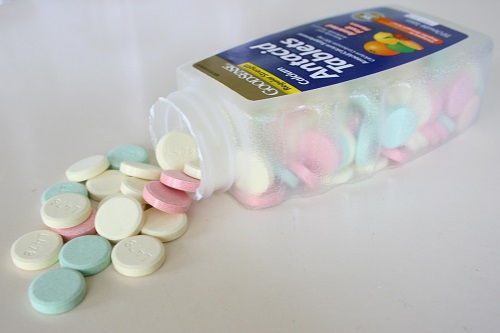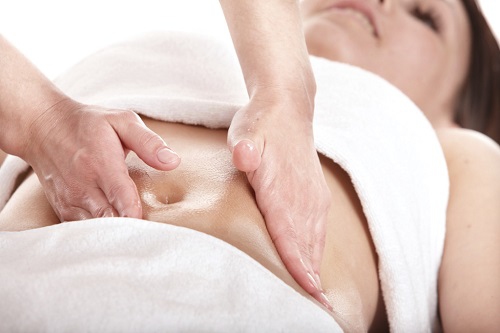Many people dread mealtime because their stomach hurts after eating. It does not have to be that way because there are many effective strategies for preventing a stomach ache after eating. Sadly enough, many people have learned to accept pain in the stomach after eating as a normal part of life. But there is nothing normal about it. A healthy person should feel no pain or discomfort after consuming food. Such pain is a symptom of certain health problem, usually something wrong with the digestive system that needs to be treated.

Why Does My Stomach Ache After Eating?
Overeating
It is no secret that people in today’s world eat far too much. Overeating can lead to indigestion by simply putting too much food in the stomach so that the foods can't be digested properly or fast enough. Many people that overeat also consume processed foods, fatty foods, dairy products and other edibles but hard-to-digest food, increasing the risk of indigestion. Limiting portions, maintaining nutritious and healthy diet and eating a number of smaller meals can prevent an upset stomach.
Hot or Spicy Foods
The growing love of spicy dishes, such as ethnic cuisines like Mexican and Asian foods, can lead to stomachache. Many of the spices commonly used in today’s cooking contain a chemical called capsaicin which can cause an upset stomach. Almost all kinds of chilies, including jalapenos and habaneros, contain it. Capsaicin is also found in chili powder, hot sauces like Tabasco, salsa and spices like paprika.
Food Intolerance
Some people’s bodies are simply incapable of digesting certain kinds of food. For example, lactose intolerant individuals cannot digest dairy products and gluten intolerant people cannot digest grains. Try eliminating various kinds of food from your diet to see if you are intolerant to them. Adjusting daily diet to avoid those foods should prevent your stomach ache after eating.
Food Allergies
Many people experience stomach ache after eating because of food allergies. You can be allergic to a wide range of foods, including dairy products, starches, spices and even grains. Try eliminating different foods from your diet to see what you are allergic to and avoid eating it.
Celiac Disease
This is a condition in which a person is allergic to gluten, a protein found in wheat, barley, and other kinds of flour. Simply avoiding baked goods, pasta, cereals and other foods that contain flour can help you avoid it. Fortunately, there are now many gluten-free foods designed for people with this condition.
Food Poisoning
Food that is infected with pathogens or contaminated with chemicals can cause a stomach ache after eating. Generally, it only occurs once and should clear up in a few hours or days after the food gets out of your system.
Peptic Ulcers
Severe stomach pain after eating can be a symptom of peptic or stomach ulcers. The usual cause of this is bacteria that literally eat holes in the lining of the stomach. The good news is it can easily be treated with antibiotics. See a doctor if you have a sharp pain in the stomach after eating.
Gallstones
A gallstone is a blockage of the gallbladder. Gallstones are characterized by intense pain, usually under the right side of your back, which can last for several hours after a meal. Fatty foods may make the problem worse. Obese people are more likely to get gallstones. Seek medical treatment immediately for such a pain.
Blocked Blood Vessels
This is a serious health problem that occurs when cholesterol plaques block the blood flow to the intestines and prevent or interfere with digestion. It may occur in people with high cholesterol. It can be a life-threatening problem because if left untreated, malnutrition may happen. So if your stomach ache after eating is caused by blocked blood vessels, medical treatments and diet changes are necessary.
Intestinal Obstruction
An intestinal obstruction is a blockage that keeps food or liquid from passing through your small intestine or large intestine (colon). It can be caused by bones or food stuck in the intestines or by a variety of health problems. Such an obstruction can cause intense pain after a meal that does not go away.
Appendicitis
A really intense stomachache in the lower right side of your abdomen can be a symptom of appendicitis. This pain often gets worse after eating, and it can be accompanied by vomiting and mild fever. Seek medical attention immediately because it can be life threatening.
Irritable Bowel Syndrome
Irritable bowel syndrome (IBS) is a common disorder that impacts the colon (large intestine). Its symptoms include cramping, abdominal pain, bloating, gas, diarrhea and constipation.
Pancreatitis
If you suffer from instant pain after eating a big meal or if your pain persists more than 6 hours, then you might have pancreatitis. This kind of pain usually starts in the upper abdomen and spreads to the side and the back, accompanied by nausea, racing heartbeat or fever.
Diverticulitis
This painful condition is caused by the formation of pouches or cysts in the bowel wall that can become infected and/or inflamed. It is usually accompanied by severe stomach cramps that occur right after eating. Seek immediate medical attention because it can lead to a dangerous infection.
How to Get Rid of Stomach Ache After Eating
Give Your Stomach a Break
Simply only drink water and fast for 24 hours to help your digestive system recovering. When you start getting hungry, start eating small servings of non-acidic foods like rice, oatmeal, and fruits and vegetables until your stomach feels better.
Take Over-the-Counter Antacids
Over the counter antacids provide a temporary relief by neutralizing acid in the stomach. Use these products sparingly because they are not a permanent solution.
Try Hot Compress
Lie flat on your back and put a hot water bottle, a heating compress or a hot towel or cloth on your stomach. Let it sit there for some time. You can repeat this several time until you feel better.
Massage Your Stomach
Lie down on your back and move your fingers around on your abdomen until feel better. This can relax your abdomen that can aid digestion. Stop immediately, if it makes the pain worse.
Eat Yogurt
Yogurt is a fermented food that contains probiotics, good bacteria that aid in digestion. Besides, eating any food that contains probiotics can provide some relief.
When to See a Doctor
A normal stomach ache after eating should disappear after a few hours. You should consult a medical professional, if:
The pain does not go away or gets worse;
You start experiencing a stomachache every time you eat;
The pain is very intense or is accompanied by symptoms like cramps.







View All Comments /Add Comment